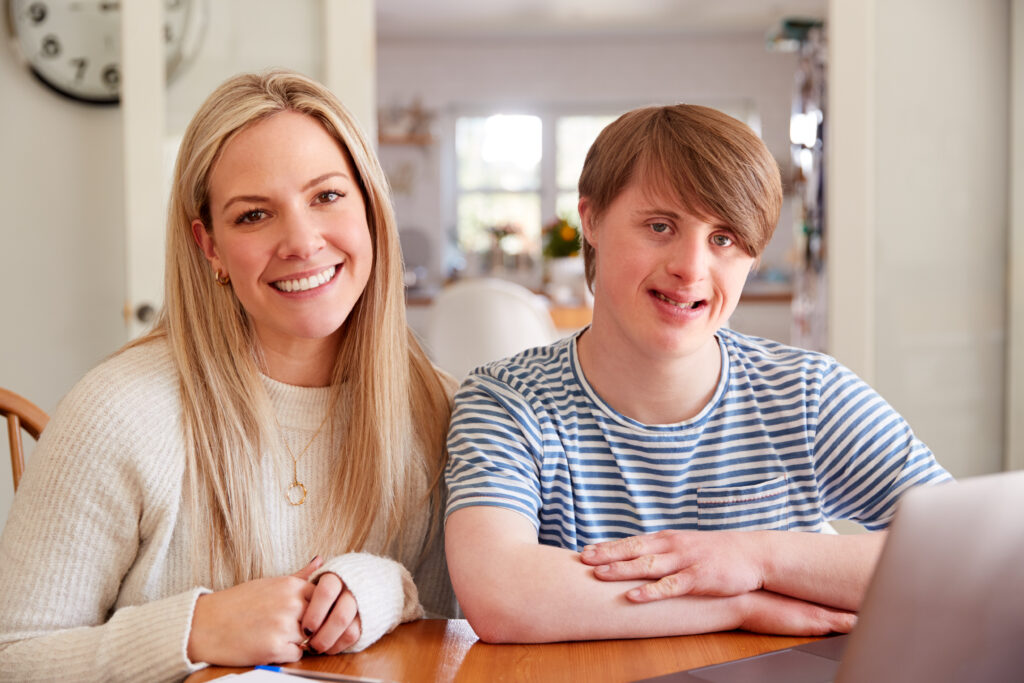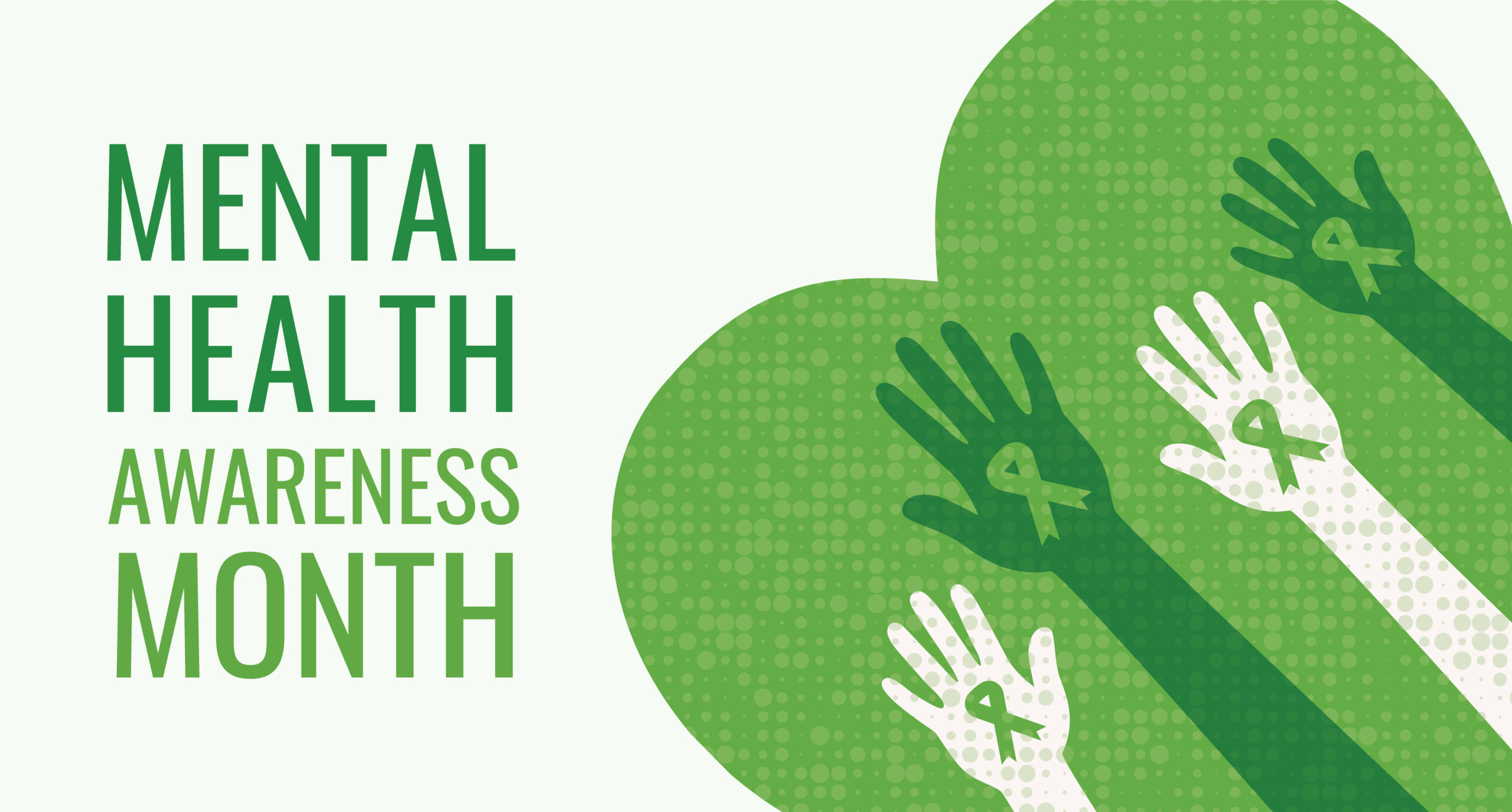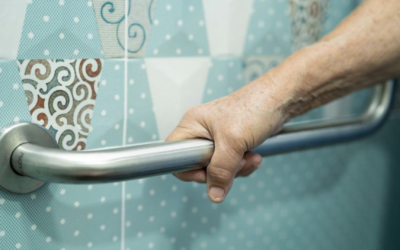Image: A graphic in green says “mental health Awareness Month” and shows several hands in green and white with green ribbons for mental health awareness.
May is Mental Health Awareness Month, an important month dedicated to raising awareness and removing stigmas around mental health issues. According to the National Institute of Mental Health, one in five adults in the US live with a mental illness (which was 57.8 million in 2021). Mental Health America’s “The State of Mental Health in America 2023” survey highlighted that 21% of U.S. adults, over 50 million people, suffer from mental illness, yet 55% receive no treatment. Additionally, 42% of adults with a diagnosable condition reported being unable to afford necessary treatment in 2023. Suicide rates have increased by 33% over the last 50 years, with a suicide occurring every 40 seconds. And about 25 million U.S. adults have used antidepressants for at least two years, marking a 60% increase in less than a decade.
For individuals with disabilities, these rates can be even higher. People with disabilities report experiencing mental distress nearly five times more than those without disabilities, according to the United Disability Services Foundation, making mental illness the leading cause of disability worldwide.

Image: A woman who is a psychiatrist is interviewing man who is a wheelchair user during therapy session.
At CPWD, we recognize the intersection between mental health and disabilities, understanding the unique challenges and needs of this community. Individuals with disabilities often face challenging circumstances that can exacerbate mental health issues which include higher rates of depression and anxiety. Societal stigma, discrimination, and accessibility barriers complicate access to needed services and lead to further problems.
One of the main barriers to accessing mental health services for people with disabilities is the lack of facilities equipped to accommodate their needs. This includes physical accessibilities, communication barriers, and the need for professionals trained to treat both mental health issues and disabilities comprehensively. There is also a critical need for professionals trained in both disability care and mental health support to offer holistic and comprehensive care. And because people with disabilities are often living within lower income brackets, it is increasingly difficult to find mental health professionals that work within the Medicaid insurance system.
A report released last week from the Department of Health and Human Services showed a critical shortage of mental health care providers for people on Medicare and Medicaid. On average, Medicare Advantage offers 4.7 providers per 1,000 enrollees, traditional Medicare provides 2.9, and Medicaid has 3.1. Some counties are in an even more dire situation, with fewer than one mental health provider available for every 1,000 enrollees. These numbers show just how challenging it can be to access mental health care.
While CPWD is not a mental health service provider, we do have resources and referrals that can assist people with disabilities in addressing mental health challenges. Our main focus is to help people with disabilities identify and achieve independent living goals. When we think of barriers to independent living, we often think of tangible things like transportation, housing, employment, mobility and so forth. But mental health challenges can also be a formidable barrier to independent living. Depression, anxiety and other mental health challenges can make taking the steps towards other goals extremely challenging. To help reduce this barrier, we offer education, advocacy, and understanding, as well as referrals to services and supports that can alleviate mental health challenges and increase the possibility of successful independent living.
Effective Programs and Resources
There are several programs that have emerged and are continuing to grow within Colorado that are opening up mental health care accessibility for people with disabilities.
Disability Law Colorado
Disability Law Colorado offers legal assistance on issues related to mental health discrimination and accessibility to mental health services, ensuring that rights are protected and advocacy is provided for necessary accommodations and support. Visit their website at disabilitylawco.org.
Colorado Crisis Services
Offering a 24/7 hotline, Colorado Crisis Services provides immediate support for any mental health, substance use, or emotional crisis, tailored to be accessible for individuals with disabilities. Call their Hotline: 1-844-493-TALK (8255) or visit their website: coloradocrisisservices.org
Individual Placement and Support (IPS) Programs
IPS programs across Colorado, such as those offered by AllHealth Network and the Mental Health Center of Denver, have shown remarkable success in supporting people with mental health conditions in gaining and maintaining employment. These programs provide tailored support, from identifying job strengths to ongoing job coaching, emphasizing the role of employment in recovery and stability.
The IPS Employment Center, originally part of the Dartmouth Psychiatric Research Center, operates based on eight foundational principles:
- Anyone who wants to work can participate in the program, and job seekers are not excluded based on diagnosis, symptoms or history.
- Employment specialists help job seekers look for competitive employment: jobs in the community paying at least minimum wage and not specified for people with disabilities.
- Services are based on the job seeker’s preferences and choices.
- Services are integrated with mental health treatment teams to provide job seekers with collaborative, professional support.
- Employment specialists help job seekers apply for employment quickly, rather than providing lengthy assessments or counseling.
- Employment specialists develop an employer network and relationships based on job seekers’ interests.
- Professional counselors provide job seekers with information about how employment may affect their government benefits.
- Job seekers get personalized support as long as they want it after obtaining employment.
To get involved with an IPS program, visit https://bha.colorado.gov/behavioral-health/ips
NAMI Colorado (National Alliance on Mental Illness)

A young man with Downs Syndrome sits with his mother looking at the camera.
NAMI offers support groups, educational programs, and advocacy to improve the lives of everyone affected by mental illness in Colorado. To learn more, visit their website: namicolorado.org
Mental Health Colorado
This organization advocates for the prevention and treatment of mental health and substance use disorders. They provide resources, engage in policy advocacy, and offer tools to help individuals navigate the mental health system. To learn more visit: mentalhealthcolorado.org
Center for People With Disabilities
We offer in-person and online peer support groups, Beyond Vision in-person and online groups and activities, and Independent Living Advisors that can help you navigate the resources and options available to you around Colorado to find the best mental health support for your needs. Click on our menu of services to see what we offer.
Advocacy and Looking Forward
Continuing advocacy for accessible mental health services and inclusive policies is crucial, and CPWD is dedicated to this mission. This includes promoting legislation to ensure all mental health facilities are fully accessible and advocating for insurance to cover a broader spectrum of mental health and support services for people with disabilities.
Mental Health Awareness Month is a reminder of the critical needs at the intersection of mental health and disability. Through advocacy, tailored programs, and community support, we can ensure that these individuals receive the comprehensive care they need to lead fulfilling lives. Together we will move forward as a society with resilience and commitment to inclusivity and accessibility in mental health care. Good mental health is right for each and every individual.





